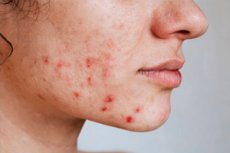New publications
Can a low calorie keto diet help alleviate acne?
Last reviewed: 02.07.2025

All iLive content is medically reviewed or fact checked to ensure as much factual accuracy as possible.
We have strict sourcing guidelines and only link to reputable media sites, academic research institutions and, whenever possible, medically peer reviewed studies. Note that the numbers in parentheses ([1], [2], etc.) are clickable links to these studies.
If you feel that any of our content is inaccurate, out-of-date, or otherwise questionable, please select it and press Ctrl + Enter.

In a small pilot study, some young women trying to lose weight on a low-calorie keto diet experienced an unexpected bonus: Their acne started to clear up.
"These results represent an opportunity to control a skin disease that affects most adolescents and many adults at some point in their lives, causing them stress, embarrassment, anxiety and low self-esteem, robbing them of their quality of life," said lead study author Luigi Barrea of Telematica Pegaso University in Naples, Italy.
His team presented their findings at the European Congress on Obesity in Vienna, Italy.
As Barrea's team explained, acne is considered a chronic inflammatory disease that affects the so-called pilosebaceous unit: the hair follicle, the hair shaft, and the adjacent sebaceous gland. About 9% of the world's population suffers from acne, mostly during adolescence.
Acne has long been linked to obesity, possibly because both conditions are associated with increased inflammation and oxidative stress, according to Italian researchers.
Can the keto diet combat this inflammation and oxidative stress?
“While the role of diet in acne is controversial, the low-calorie keto diet is known to aid weight loss and create anti-inflammatory ketone bodies, which provide energy when carbohydrates are scarce in the diet and help fight inflammation and oxidative stress,” Barrea explained in a press release. “We decided to explore this potential acne treatment.”
Their study was small: just 31 young women (ages 18–30) who were obese and had moderate levels of acne.
All women began a 45-day low-calorie keto diet (only 700-800 calories per day). According to the keto regimen, 44% of calories came from fat, 43% from protein, and only 13% from carbohydrates.
All women completed the diet successfully, reporting some mild "side effects" such as headaches and muscle weakness.
The weight-loss results were impressive. Over 45 days, the women lost an average of about 8 percent of their body weight, with a similar percentage reduction in waist circumference, Barrea's team reported.
Acne also improved: on the standard Global Acne Rating Scale, the average score improved by 41.5% over the 45-day diet period.
Additionally, "participants also reported significant improvements in quality of life, with an average improvement of 45%," the researchers reported.
Barrea's team said there was a scientific basis for the improvement in acne. They found that markers of systemic inflammation, oxidative stress, and gut microbiome health all improved. Improvements in inflammation and oxidative stress appeared to correlate with reduced acne severity, the team said.
“In this small pilot study, a 45-day low-calorie keto diet showed significant improvements in acne severity that appeared to be related to the diet’s known antioxidant and anti-inflammatory effects,” Barrea concluded.
However, he stressed that the study was very small and, because the results were presented at a medical conference, they should be considered preliminary until published in a peer-reviewed journal.
However, "if confirmed in larger, more robust studies, the low-calorie keto diet could be a valuable alternative to antibiotics and topical treatments to help the many thousands of people suffering from acne," Barrea said.
